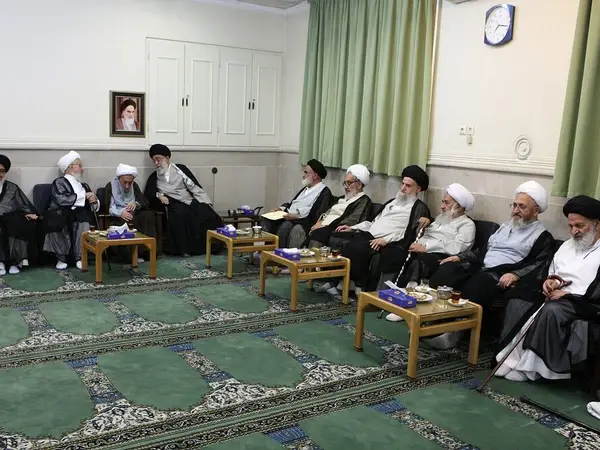Some of the highest-ranking Iranian clerics have protested to high inflation, sharply rising prices and the inept management of the markets by the government.
The high-ranking clerics have spoken against President Ebrahim Raisi's ultraconservative government, only after the Speaker of the Iranian Parliament Mohammad Bagher Ghalibaf (Qalibaf) who calls himself a neo-conservative went to see them in Qom.
This might be the starting point of a shift from policies based on conspiracy theories inspired by presidential adviser Saeed Jalili to more pragmatic ideas Ghalibaf has been offering as a prelude to what he called a move toward "a new governance" in Iran. Some social media users have called the move "a soft coup by pragmatists against the ultraconservatives," who try to blame most problems on machinations by “enemies”, meaning the United States and its allies.
The move comes while the Iranian government is at its lowest point of popularity after three months of street protests and another sharp devaluation of the Iranian currency in a matter of a week which brought the rate of exchange for the US dollar to 440,000 rials.
The clerics, the "sources of emulation" as they are known in Qom, hold the highest ranks in Iran's brand of Shi'ism and they are supposed to lead the nation by example in all matters of everyday life. Nonetheless, it is not clear how many people follow them and their advice.
Following meetings with Ghalibaf, Ayatollah Nouri Hamadani, a clerics who has been always silent in the face of whatever that the government has done to the economy, criticized Raisi for bragging about the country's progress and the state of the economy: "No prices have fallen and none of the people's problems have been solved. The only thing that has certainly happened is the devaluation of the Iranian currency."
Ayatollah Nasser Makarem Shirazi who has usually supported the Raisi administration and all the government's hard-line policies, said, "Not only the economic situation is not improving, but the inflation rate has been rising. People ask us why we do not warn the government about the situation. In factو we do warn, but the state television never broadcast our warnings."
Despite his criticism of the government's economic policies, Makarem Shirazi strongly supported the crackdown on protesters.
Ayatollah Jafar Sobhani said that "the Raisi administration has been always promising to solve the people’s problems but this promise has never been met." And Ayatollah Abdollah Javadi Amoli referred to inept officials and said, "We should not appoint good but otherwise inept individuals or capable but bad individuals who will embezzle government funds."
One of the first outcomes of the ayatollahs’ remarks against the Raisi administration was the replacement of Iran's Central bank Governor Ali Salehabadi who resigned on Thursday. The new Central Bank governor Mohammad Reza Farzin is no different from Salehabadi in terms of policies. However, the shock in the Iranian market because of rial’s steep fall forced the government to make a change to pretend that it cares. The actual change was a slight boost for the rial.
The Jomhouri Eslami newspaper, a conservative daily critical of the Raisi administration's ultraconservative policies, wrote in an editorial on Thursday that it would be a big mistake by officials to get the message of the ongoing protests wrong. And, not acknowledging the government's errors could be an even bigger mistake."
The daily pointed out that there is no silent majority in Iran. The people are suffering from injustice, economic corruption, high inflation and government's broken promises and they feel humiliated as the government does not seek their political participation. All of this and the government's insistence on its mistakes will inevitably escalate the people's dissatisfaction.
